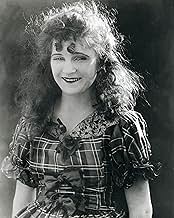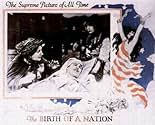Die Familie Stoneman findet ihre Freundschaft mit den vom Bürgerkrieg betroffenen Kamerunern, die beide in gegenüberliegenden Armeen kämpfen. Die Entwicklung des Krieges in ihrem Leben reich... Alles lesenDie Familie Stoneman findet ihre Freundschaft mit den vom Bürgerkrieg betroffenen Kamerunern, die beide in gegenüberliegenden Armeen kämpfen. Die Entwicklung des Krieges in ihrem Leben reicht bis hin zu Lincolns Ermordung und der Geburt des Ku Klux Klan.Die Familie Stoneman findet ihre Freundschaft mit den vom Bürgerkrieg betroffenen Kamerunern, die beide in gegenüberliegenden Armeen kämpfen. Die Entwicklung des Krieges in ihrem Leben reicht bis hin zu Lincolns Ermordung und der Geburt des Ku Klux Klan.
- Auszeichnungen
- 2 wins total
- Col. Ben Cameron aka The Little Colonel
- (as Henry Walthall)
- Silas Lynch - Mulatto Lieut. Governor
- (as George Seigmann)
- Jeff - The Blacksmith
- (as Wallace Reed)
- Abraham Lincoln
- (as Jos. Henabery)
- Wade Cameron - The Second Son
- (as J.A. Beringer)
- Duke Cameron - The Youngest Son
- (as John French)
Empfohlene Bewertungen
One of the posters remarked on how ridiculous the Klansmen's hoods looked. Actually, the original "ghost costumes" were all homemade and there was no standardized uniform- some had spikes on the head, horns, painted faces on the masks, etc.
I myself had an ancestor who was a member of the Reconstruction Ku Klux Klan, and they saw themselves as guerilla fighters against an occupying power, not as terrorists. Today we can condemn them. At the time, it must have seemed to them that the war was over, but that the battle lines were still firmly drawn.
This film is a good peek into the attitude of the general public in 1915 about Reconstruction. It became a national obsession, and probably gave impetus to Col. William Joseph Simmons's decision to "resurrect" the Klan in that year.
This movie is not anti-Union, it is not pro-Antebellum south. It is anti-Black. The movie frames the ending of slavery as the beginning of the end for civilized society in the south, brought about by a conspiracy of carpet-baggers and scheming mulattos and blacks. The answers to this issue are redemptive violence by the Klu Klux Klan and a return to the master-servant relationship of slavery. The movie frames "the loyal soul" blacks who accepted their ownership and didn't want slavery to end as the redeemable memebers, while those that welcomed the end of slavery did so entirely to then turn that systemic violence back against the whites.
I genuinely do not believe that you can understand how malicious and hateful this movie is if you haven't seen it. One can have it described to them, one can know the individual scenes of hatred within, but until one has experienced the slow, pernicious leaking of racial hatred firsthand, it can't sink in how contemptible this movie is.
Technically important? Yes, nobody is denying that. Even as the movie's message becomes more and more evil, it is shot with a competency and ambition that it would take the rest of the industry decades to catch up to. It is worthy of preservation in that regard. But it is also entirely indicitave of the era that a movie which makes such strides (and was the first film to see great success in America and be played in the white house) is a movie which frames the idea of a white man being expected to shake a black man's hand as an indignity which exceeds lynchings and enslavement.
Films showing conflicts must present both sides as believing utterly in the righteousness of their cause; but historical films also have at least a moral responsibility to ensure the material shown has some reasonable approximation to historical accuracy, and whenever possible the convictions of both sides should be equally fairly presented. Most of the criticisms of TBOAN on this database derive not from its sympathetic presentation of the KKK but from the fact that this is presented as the only side which is relevant. We need to remember that slavery was introduced into human society back in prehistoric times - it was usually associated with a recognised obligation on the part of the slave-owner to provide a reasonable standard of living for his slaves, and alternative mediaeval societies from which slavery had been eliminated often did not do even this for their dispossessed citizens. Members of ruling classes everywhere lived a lifestyle which required the full time labours of many slaves or underprivileged workers to maintain, and only after the invention of the steam engine did it become possible to picture a world from which slavery might eventually be eliminated. Although this then probably became inevitable, its elimination has still not been completed; and in the United States it took place in an appallingly destructive way, part of which is pictured in TBOAN. Every nation has shameful episodes in its history which have and will cause distress for many generations before they are gradually outgrown. Recognising that the American Civil War did not result only from a dispute about slavery but much more from a whole range of economic and cultural issues, I appreciate that it would be grossly improper for me as a Canadian to seize on some of the controversial aspects of TBOAN as an excuse to condemn the film. I will re-watch it as a valid and important effort to document the concerns of the group of citizens it featured (although I will still reserve the right to feel Griffith should have made more effort to also document the concerns of those with opposing viewpoints.) My concerns here are directed more to assessing the importance of TBOAN in the development of the modern cinema, and I currently find myself siding with the relatively few users who have commented that its significance seems to be greatly overrated. When I first saw this film I had seen relatively few of the important early silent films, and it was easy to accept claims that Griffith's work was of overwhelming importance. Now I have seen other contemporary works; and have also come to appreciate that all surviving copies of about 90% of these works have totally disappeared (whilst probably half of the 10% of which copies still exist are not available for home viewing even from specialist libraries as the only copies are located in inaccessible archive collections). This is not brought out clearly by most of the 200 user comments on this film listed by IMDb, and it is so important that it has led me to pen these further comments. Film-makers in the silent era were extremely productive - Griffith himself is credited by IMDb with having directed over 500 films, most of them silent, and several other directors/producers have well over 100 films credited. Since so few survive, we must recognise how far our current assessment of early directors might change if we were able to see and compare more of their works. I believe that many innovations in film technology have been exclusively attributed to Griffith primarily because of the ready availability today of copies of 'TBOAN', 'Intolerance' and 'Orphans of the Storm'. I found this feeling very strongly reinforced when I had a rare chance to see a screening of Lois Weber's 'Hypocrites'. Weber was, for a time, the highest paid director in Hollywood and received a best director award in 1916 (ahead of Griffith, just one year after he released TBOAN). All I will say at this point is that, although I am admittedly relying on rather uncertain memories, I believe 'Hypocrites' was more stimulating for its innovative cinematographic techniques than 'Intolerance'. It would be interesting to know whether other database users have had similar thoughts about this or other early works.
Wusstest du schon
- WissenswertesPresident Woodrow Wilson is famously rumored to have responded to the film with the remark: "It is like writing history with lightning. And my only regret is that it is all so terribly true." After the film became subject of controversy due to its heroic portrayal of the Ku Klux Klan, Wilson denied through his press secretary as to having known about the nature of the film before screening it at the White House, or having ever endorsed it. Nevertheless, Wilson's published works as a historian are closely aligned with the film's negative portrayal of Reconstruction (some of his writings are even quoted onscreen in certain prints of the film). Wilson was also notably a consistent pro-segregationist as President.
- PatzerThe Ku Klux Klan never fought or won any battles with federal troops, black or white.
- Zitate
intertitle: While youth dances the night away, childhood and old age slumber.
- Crazy CreditsThe following was listed in the opening credits: A PLEA FOR THE ART OF THE MOTION PICTURE We do not fear censorship, for we have no wish to offend with improprieties or obscenities, but we do demand, as a right, the liberty to show the dark side of wrong, that we may illuminate the bright side of virtue--the same liberty that is conceded to the art of the written word--that art to which we owe the Bible and the works of Shakespeare.
- Alternative VersionenIn both 1921 and 1927, edited versions of the film were released to reflect current political viewpoints.
- VerbindungenEdited into The Revenge of Pancho Villa (1932)
Top-Auswahl
Details
Box Office
- Budget
- 110.000 $ (geschätzt)
- Laufzeit
- 3 Std. 15 Min.(195 min)
- Sound-Mix
- Seitenverhältnis
- 1.33 : 1








































